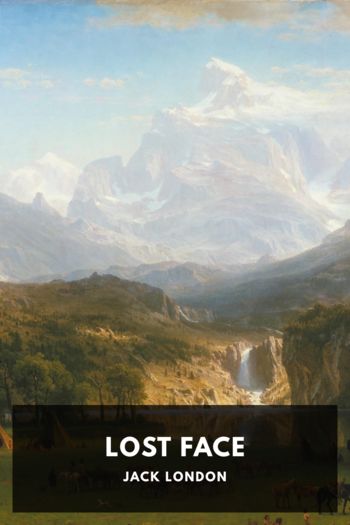Lost Face by Jack London (primary phonics txt) 📕

- Author: Jack London
Book online «Lost Face by Jack London (primary phonics txt) 📕». Author Jack London
By the time he had descended to the Scales, the steep pitch of Chilcoot was past, and the way became easier. Not that it was an easy way, however, in the best of places; but it became a really possible trail, along which he could have made good time if he had not been worn out, if he had had light with which to pick his steps, and if it had not been for Bondell’s gripsack. To him, in his exhausted condition, it was the last straw. Having barely strength to carry himself along, the additional weight of the grip was sufficient to throw him nearly every time he tripped or stumbled. And when he escaped tripping, branches reached out in the darkness, hooked the grip between his shoulders, and held him back.
His mind was made up that if he missed the Athenian it would be the fault of the gripsack. In fact, only two things remained in his consciousness—Bondell’s grip and the steamer. He knew only those two things, and they became identified, in a way, with some stern mission upon which he had journeyed and toiled for centuries. He walked and struggled on as in a dream. As part of the dream was his arrival at Sheep Camp. He stumbled into a saloon, slid his shoulders out of the straps, and started to deposit the grip at his feet. But it slipped from his fingers and struck the floor with a heavy thud that was not unnoticed by two men who were just leaving. Churchill drank a glass of whisky, told the barkeeper to call him in ten minutes, and sat down, his feet on the grip, his head on his knees.
So badly did his misused body stiffen, that when he was called it required another ten minutes and a second glass of whisky to unbend his joints and limber up the muscles.
“Hey not that way!” the barkeeper shouted, and then went after him and started him through the darkness toward Canyon City. Some little husk of inner consciousness told Churchill that the direction was right, and, still as in a dream, he took the canyon trail. He did not know what warned him, but after what seemed several centuries of travelling, he sensed danger and drew his revolver. Still in the dream, he saw two men step out and heard them halt him. His revolver went off four times, and he saw the flashes and heard the explosions of their revolvers. Also, he was aware that he had been hit in the thigh. He saw one man go down, and, as the other came for him, he smashed him a straight blow with the heavy revolver full in the face. Then he turned and ran. He came from the dream shortly afterward, to find himself plunging down the trail at a limping lope. His first thought was for the gripsack. It was still on his back. He was convinced that what had happened was a dream till he felt for his revolver and found it gone. Next he became aware of a sharp stinging of his thigh, and after investigating, he found his hand warm with blood. It was a superficial wound, but it was incontestable. He became wider awake, and kept up the lumbering run to Canyon City.
He found a man, with a team of horses and a wagon, who got out of bed and harnessed up for twenty dollars. Churchill crawled in on the wagon-bed and slept, the gripsack still on his back. It was a rough ride, over water-washed boulders down the Dyea Valley; but he roused only when the wagon hit the highest places. Any altitude of his body above the wagon-bed of less than a foot did not faze him. The last mile was smooth going, and he slept soundly.
He came to in the grey dawn, the driver shaking him savagely and howling into his ear that the Athenian was gone. Churchill looked blankly at the deserted harbour.
“There’s a smoke over at Skaguay,” the man said.
Churchill’s eyes were too swollen to see that far, but he said: “It’s she. Get me a boat.”
The driver was obliging and found a skiff, and a man to row it for ten dollars, payment in advance. Churchill paid, and was helped into the skiff. It was beyond him to get in by himself. It was six miles to Skaguay, and he had a blissful thought of sleeping those six miles. But the man did not know how to row, and Churchill took the oars and toiled for a few more centuries. He never knew six longer and more excruciating miles. A snappy little





Comments (0)